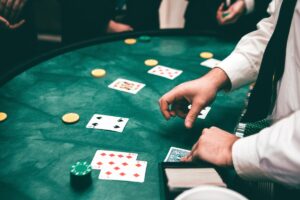 The late Tommy Carmichael was a television repair man-turned-inventor, who devoted nearly twenty years of his adult life to devising innovative ways to cheat slot machines. Carmichael began his life of crime with a nuts-and-bolts device, known as a ‘top-bottom joint’, to which he was introduced in the early Eighties. A crude affair, consisting of a curved piece of metal and a guitar string, the top-bottom joint effectively short-circuited the coin hopper of older, electromechanical slot machines, causing an illicit payout. Carmichael was arrested, convicted and sentenced to five years’ imprisonment for using the device in Las Vegas in 1985.
The late Tommy Carmichael was a television repair man-turned-inventor, who devoted nearly twenty years of his adult life to devising innovative ways to cheat slot machines. Carmichael began his life of crime with a nuts-and-bolts device, known as a ‘top-bottom joint’, to which he was introduced in the early Eighties. A crude affair, consisting of a curved piece of metal and a guitar string, the top-bottom joint effectively short-circuited the coin hopper of older, electromechanical slot machines, causing an illicit payout. Carmichael was arrested, convicted and sentenced to five years’ imprisonment for using the device in Las Vegas in 1985.
He served just two years in prison but, on his release in 1987, slot machine had become more sophisticated. In response, Carmichael acquired a state-of-the-art machine and created a novel cheating device, known as the ‘slider’, or ‘monkey paw’, which was effective against the latest technology. Again employing a guitar string, together with a piece of sprung steel, the slider could be inserted into the payout chute, tripping a microswitch and causing the illegal release of coins from the hopper.
By the early Nineties, slot machine technology had moved on again, rendering the slider obsolete. Nevertheless, posing as a prospective buyer, Carmichael examined the inner workings of of a cutting-edge, computerised machine and devised a fresh device, known as the ‘light wand’. As the name suggests, the light wand employed a miniature light bulb powered by a camera battery – making it nigh on undetectable – and effectively ‘blinded’ the optical payout sensor when shone into the machine.
Carmichael was subsequently arrested in 1996, 1998 and 1999, on the latter occasion pleading guilty to running an illegal gambling enterprise, for which he was sentenced to time served plus three years’ probation. He died, at the age of 68, in 2019, but for the last 16 years of his life his name appeared on the Nevada Gaming Control Board List of Excluded Persons, a.k.a. the ‘Black Book’, so he was officially banned from every casino in the state.
Trusted casino chip connoisseur Gregg Fisher has been out and about again. It must be nice to have a passion that means that points of interest are all around you – and of course Nevada is the right place to be if those interests pertain to casinos and the all important chips that form the currency of the establishment.
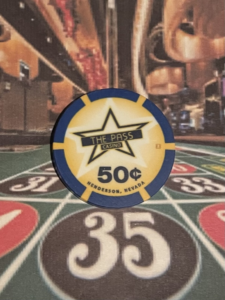 | 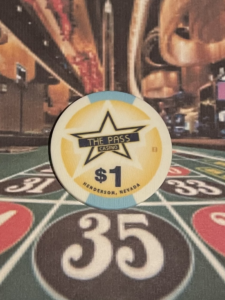 | 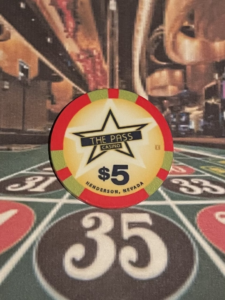 |
Above are images of the $.50, $1 and $5 chips (taken by Gregg) from the recently opened Pass Casino, which was formerly the Eldorado Casino. With a sportbooks, 6 table games (four blackjack tables, a roulette table and a craps table) and an impressive 350 slot machines there’s something for casino and sports fans alike.
DeSimone Gaming have made changes aplenty including a 24/7 sports bar and Emilia’s Café, as well as a new lounge, The Silver Bar.
With a rich history over the decades, opening first as the Wheel Casino in 1961, all the way through to the $7 million renovation that led to its latest incarnation, it will be interesting to see what the general public think of The Pass Casino. It opened on April 1st 2021.
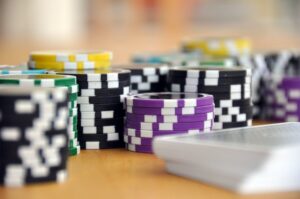 Once described by the High Court of Australia as the ‘highest of high rollers’, Harry Kavakas was, in his heyday, an eminently successful property salesman. He accrued a multi-million fortune selling houses on the Gold Coast in Queensland, in northeastern Australia, but frittered away everthing he had, and more, at the Crown Casino in Melbourne. In a 14-month spell between June 2005 and August 2006, Kakavas staked an eye-watering A$1.5 billion on baccarat, betting up to A$300,000 a hand, and lost A$30 million, including $A2.3 million in less than half an hour on once occasion.
Once described by the High Court of Australia as the ‘highest of high rollers’, Harry Kavakas was, in his heyday, an eminently successful property salesman. He accrued a multi-million fortune selling houses on the Gold Coast in Queensland, in northeastern Australia, but frittered away everthing he had, and more, at the Crown Casino in Melbourne. In a 14-month spell between June 2005 and August 2006, Kakavas staked an eye-watering A$1.5 billion on baccarat, betting up to A$300,000 a hand, and lost A$30 million, including $A2.3 million in less than half an hour on once occasion.
Kavakas later made legal history when, in 2007, he sued Crown Casino for ‘unconscionable conduct’. Kavakas’ laywers argued that Crown Casino has exploited his ‘pathological urge to gamble’ by providing him with complimentary accommodation, food and drink and travel, plus so-called ‘lucky money’, at up to A$50,000 a time, to a total value of nearly A$10 million. Crown Casino, on the other hand, argued that Kavakas presented himself not as a problem gambler – which, by his own admission, he was – but rather as an affluent businessman, who could afford to gamble the astronomical sums involved.
Kavakas’ claim for A$20.5 million in damages for his net losses, heard in the Supreme Court of Victoria, was dismissed on the grounds that Crown Casino was legimately competing for his business and Kavakas had, in fact, demonstrated that he found it possible to refrain from gambling. Kavakas subsequently appealed to the Court of Appeal in Victoria and, finally, to the High Court of Australia but, in both cases, his appeal was unanimously dismissed.
 As many of you will no doubt know, bitcoin is sometimes used as a payment method in online casinos. Such avenues to spend (and of course win!) are only natural for an online currency, and arguably contribute to its place and relevance for society. That said, I don’t actually own bitcoins myself even thought I’ve often talked about them over the years. Really I’m kicking myself because if I’d ‘had a punt’ clearly right about now I’d be sitting pretty.
As many of you will no doubt know, bitcoin is sometimes used as a payment method in online casinos. Such avenues to spend (and of course win!) are only natural for an online currency, and arguably contribute to its place and relevance for society. That said, I don’t actually own bitcoins myself even thought I’ve often talked about them over the years. Really I’m kicking myself because if I’d ‘had a punt’ clearly right about now I’d be sitting pretty.
For the longest time I didn’t actually check the value of them on account that I knew I’d messed up and didn’t want to see how badly. The sense of dread that sets in when you realise that a virtual currency you pondered buying at $4000 a few months prior is now at the $30,000 mark. Still, however bad I feel it pales into insignificance when compared to the Bitcoin experience of Newport, Wales man James Howells.
Howells had the foresight to obtain a substantial 7500 bitcoins in 2009 for almost nothing, but unfortunately also had the misfortune to accidentally throw out his hard-drive in 2013, when the coins were worth a cool £4,000,000.
“I had a clearout of my old IT equipment – I hadn’t used this drive for over three years, I believed I’d taken everything off it… so it got thrown in the bin.
I had been hearing a few stories of a chap from Norway who had bought a number of coins for a very low price and had sold them for a high price and that’s when I got back into checking the price and seeing what I’d done.
When I found out what the price was, the penny dropped and I realised the coins I have ‘mined’ were on the drive I had thrown away. There was not a lot I could do.”
Without backups and with no joy getting the local tip to search on the local landfill site all hope was lost. To make matters worse the coins would now be worth an astonishing £210m. Howells has again recently pleaded with the council to let him search the tip, and has had interest in helping him. He’s even volunteered to donate a very substantial portion of the money if he’s allowed to do so, but so far hasn’t received a positive response.
So the next time you regret not buying bitcoins back when they were giving them out like candy, at least be glad you’re you didn’t buy and then lose them, like this unfortunate soul and many like him!
